
November 15
1862 Birth: Adolf Bartels: German professor and literary historian who will wage a relentless and uncompromising campaign to eliminate Jews and "pseudo-Jews" from German literature. To this end, Bartels will found a pseudo-science that evaluates literature based on the author's "race." Using family trees, photographs of the author and his ancestors, place of birth, work history, language, style, family and social milieu, Bartels attempted to "dejudaize" German literature. He died in Weimar on March 7, 1945. 1867 First stock ticker debuts:
On this day in 1867, the first stock ticker is unveiled in New York City. The advent of the ticker ultimately revolutionized the stock market by making up-to-the-minute prices available to investors around the country. Prior to this development, information from the New York Stock Exchange, which has been around since 1792, traveled by mail or messenger. . . .
The last mechanical stock ticker debuted in 1960 and was eventually replaced by computerized tickers with electronic displays. A ticker shows a stock's symbol, how many shares have traded that day and the price per share. It also tells how much the price has changed from the previous day's closing price and whether it's an up or down change. A common misconception is that there is one ticker used by everyone. In fact, private data companies run a variety of tickers; each provides information about a select mix of stocks.[For further information, click here]
1885 Birth: Sir Frederick Handley Page:
British aircraft designer who built the Handley Page 0/400, the world's first twin-engine bomber for the Royal Flying Corps, one of the largest planes used in WW I, which carried out their first large-scale bombing raids on enemy military installations and submarine bases in Nov 1916. By 1918, he had produced a four-engine bomber that could attack the industrial zones of the Saar and the Ruhr in Germany. In 1930, he produced the first 40-seat civilian airliner, the Hercules. For WW II, Page returned to producing military aircraft, the most important being the Halifax bomber. The government purchased 7,000 of these planes. He was knighted for his contribution to the war effort. After the war Page designed the four-engine jet bomber, the Victor.
1891 Births: Various: Erwin Rommel:
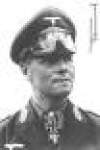
Erwin Rommel, the German commander known as the "Desert Fox" for his cunning in North Africa during World War II, is born in Heidenheim, Germany.
Rommel's father and grandfather were teachers, but he chose a military career for himself, enlisting in the German army as an officer cadet in 1910. He served in World War I as a lieutenant and was decorated for bravery and recognized for his leadership abilities. While other promising officers in his situation sought a wartime place on the general staff, Rommel remained in the infantry as a front-line officer. Between the wars, he taught at various military academies and wrote an important textbook on infantry strategy.
After the outbreak of World War II in 1939, Rommel was appointed to command the Seventh Panzer Division in the invasion of France. Though he had little experience with armored warfare, he immediately grasped its potential and played a leading role in Germany's triumphant drive across France in May and June 1940.
In February 1941, German leader Adolf Hitler appointed Rommel to lead the German divisions dispatched to Libya to stiffen the all-but-defeated Italian forces there. The British commanders in North Africa were no match for Rommel, and by May he had won back nearly all the territory lost by the Italians during the Allies' winter drive. To the Allies and Axis alike, Rommel became known as the Desert Fox for his elegant deceptions and audacious surprise attacks. Hitler promoted him to field marshal.
In 1942, Rommel pressed almost to Alexandria with his Afrika Corps, but he was halted by the British at El Alamein. In October 1942, British General Bernard Montgomery launched a major offensive against Rommel at the Second Battle of El-Alamein, overwhelming Rommel's outnumbered forces. Disobeying an order from Hitler, Rommel ordered a retreat and his Afrika Corps fled to Tunis.
Before the final surrender of Axis forces in North Africa, Rommel was called back to Europe in March 1943 and entrusted with defending northern France from Allied invasion. He erected a sophisticated system of coastal defense works but was denied his request for large numbers of troops to defend against the expected attack. On June 6, 1944, the Allies successfully landed at Normandy.
Meanwhile, a conspiracy against Hitler had been brewing among German army commanders who felt that the Fuehrer was leading Germany to certain ruin. The plotters approached Rommel; he was sympathetic but took no direct role in the planning of Hitler's assassination. There was talk that Rommel, a popular figure known as the "people's marshal," would serve as German head of state after Hitler's death.
Three days before the attempted coup took place, Rommel suffered serious head injuries after a British aircraft attacked his car. He was thus in the hospital on July 20 when Hitler narrowly escaped being killed by a bomb in Berlin. However, the conspirators, arrested and tortured for information, revealed Rommel's involvement. Hitler sent two generals to Rommel, who was just recovering from his injuries, to offer him the choice of suicide or trial. Rommel chose the former and on October 14 took a lethal dose of poison. He was later buried with full military honors. (History.com)
William Averell Harriman, in New York City:
Franklin D. Roosevelt appointed Harriman as U.S. Ambassador of the Soviet Union in 1943. He held the post until 1946 when Harry S. Truman appointed him as Secretary of Commerce. Harriman worked on the Marshall Plan and served as national security adviser during the Korean War.
A member of the Democratic Party Harriman was elected governor of New York in 1954. After two unsuccessful attempts to become the Democratic presidential nomination in 1952 and 1956 Harriman served in several posts under President John F. Kennedy. This included negotiating the Nuclear Test Ban Treaty in 1963.
Despite being named as a Soviet spy by Anatoli Golitsin, Harriman was appointed by President Lyndon B. Johnson as ambassador-at-large for Southeast Asian affairs in 1965. He also served as chief US negotiator when preliminary peace talks opened in France between the United States and North Vietnam in 1968.
Harriman lost this position as US negotiator under President Richard Nixon but returned to office in 1978 when he was appointed the senior member of the US Delegation to the United Nations General Assembly's Special Session on Disarmament. William Averell Harriman died in 1986. (Spartacus)
1902 The German Workers Party (DAP) is first organized in the northern Bohemian city of Aussig (Usti nad Labein).
1906 Birth: Curtis LeMay:
[One] of the icons of American military history. . . .LeMay did not attend West Point, earning his commission through the Reserve Officer Training Corps at The Ohio State University in 1928. Over the next decade he became widely known as one of the best navigators and pilots in the Air Corps. . . .
War brought rapid promotion and increased responsibility. LeMay began as a group commander in the Eighth Air Force, but within 18 months had gone from lieutenant colonel to major general and an air division commander. He had earned a reputation as an unusually innovative tactician and problem solver, so when Hap Arnold had difficulty bringing the new B29 into combat service, he chose LeMay to spur the program and then take over B29 operations in China. His ability led Arnold to name him commander of the B29s in the Marianas where the main air effort against Japan was centered.
Always a tactical innovator, LeMay took the risky and controversial step of abandoning the long-held American doctrine of high-altitude, daylight, precision bombing, and instead stripped his B29s of guns, loaded them with incendiaries, and sent them against Japanese cities at night and at low level. The new strategy was remarkably successful; Japan was devastated, and the dropping of the atomic bombs in August 1945 brought the Pacific war to an end without an invasion of the Japanese home islands and the hundreds of thousands of casualties that would have entailed. . . .
LeMay. . .was sent to Germany as commander of the air forces in Europe arrayed against the Soviets. In this position he was responsible for getting the Berlin airlift started in mid1948 after the Soviets had instituted a ground blockade of the city. This crisis precipitated a major reshuffling in Washington. A war with the Soviets appeared increasingly possible, and the Strategic Air Command, which would bear the brunt of such a war, was seen as deficient. As a result, Hoyt Vandenberg relieved George Kenney from command at SAC and named LeMay his successor. The building of SAC into an effective and efficient war-fighting arm was LeMay's greatest accomplishment. . . .
In 1957 LeMay was named vice-chief of staff, and. . .in 1961, he was elevated to the position of chief. LeMay was one of the coldest of America's cold warriors, and partly for this reason his tenure as chief was neither successful nor happy. Under the new management policies of Defense Secretary Robert McNamara and the "flexible response" military strategy of Joint Chiefs of Staff chairman Gen Maxwell D. Taylor, LeMay found himself at constant odds. In his four years as chief, LeMay argued strenuously for new air weapons like the Skybolt missile and B70 bomber, and against the swingwing "fighter" plane, the General Dynamics TFX (later named the F111). He lost all these battles. Moreover, LeMay had strong feelings regarding American involvement in Vietnam, arguing against the gradual response advocated by the administration. Once again he was ignored. When he retired in 1965, LeMay was widely regarded, and probably rightly so, as a great commander of SAC but as a poor chief. His abortive political "career" as George Wallace's running mate in the 1968 presidential election only further tarnished the reputation he had built as a war commander and leader of SAC. [For further information, click here]
1907 Birth: Colonel Claus Schenk Graf von Stauffenberg: member of the group of army officers who will attempt to assassinate Hitler and take over the German government on 20 July 1944.
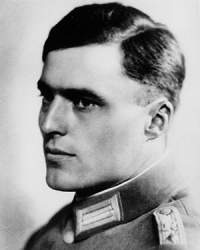
Von Stauffenberg was a German aristocrat . . . . Entering the military in 1926, he gained considerable insight into the workings of German politics. Most surprising, in 1932 he campaigned in favor of Adolf Hitler when the latter sought to win the general election. In 1933 he could be found amongst the members of the SA (Sturmabteilung). Continuing to climb the ranks of the military, he nonetheless was contacted in 1939 by Ulrich Graf Schwerin von Schwanenfeld who sought to involve von Stauffenberg in a coup attempt. Von Stauffenberg declined, but did not report von Schwanenfeld to the authorities. 1941 still found von Stauffenberg among Hitler's supporters, but a change of heart took place swiftly and in 1942 he is said to have joined the military resistance. [For further details, Click here.]

1914 List Regiment: Just after midnight, the List Regiment moves into position for a 7 am attack on a French-held wooded area near Wytschaete. The assault began at 7 o'clock precisely; but the troops had scarcely left their protective cover when the enemy threw down a murderous rifle and machine-gun fire on the unprotected assault troops. Worst of all was an enemy battery on the left flank, which caused such heavy losses as to render any further progress unthinkable. Hour after hour passed, without it being possible to make even the slightest forward movement. 46 As commander of the 16th Regiment of Bavarian Infantry at the Battle of Ypres in the period from November 10 to November 17 1914, I came to know Adolf Hitler as an exceedingly brave, effective, and conscientious soldier. I must emphasize the following: As our men were storming the wedge-shaped forest, I stepped out of the woods near Wytschaete to get a better view of developments. Hitler and the volunteer Bachmann—another battle orderly belonging to the 16th regiment—stood before me to protect me with their bodies from the machine-gun fire, to which I was exposed. 47 The regimental commander wanted to intervene personally and set out from the ravine for the edge of the woods. [But] he had hardly been discovered by the keen eye of the enemy, when murderous infantry and machine-gun fire was directed at him. He would have paid with his life for his foolhardiness, [had not] the regimental orderlies accompanying him—Adolf Hitler and Bachmann—sprang forward, [and] protected him with their bodies: pushing him back to safety, saying that the regiment could not afford to lose its second commander in so short a time . . . . Unfortunately, the fears of the two orderlies were fulfilled all too quickly. 48 Click to Enlarge My job now is to carry dispatches for the staff. As for the mud, things are a bit better here, but also more dangerous. In Wytschaete during the first day of the attack, three of us eight dispatch riders were killed, and one was badly wounded. The four survivors—and the man who was wounded—were cited for their distinguished conduct. While they were deciding which of us should be awarded the Iron Cross, four company commanders came to the dugout. That meant that the four of us had to step out. We were standing some distance away about five minutes later, when a shell slammed into the dugout, wounding Lieutenant Colonel Engelhardt, and killing or wounding the rest of his staff. This was the most terrible moment of my life. We worshiped Lieutenant Colonel Engelhardt. 49
Regimental adjutant Georg Eichelsdoerfer:
Lieutenant Colonel Philipp Engelhardt:
Georg Eichelsdoerfer:

Drawing from the Front, by Hitler
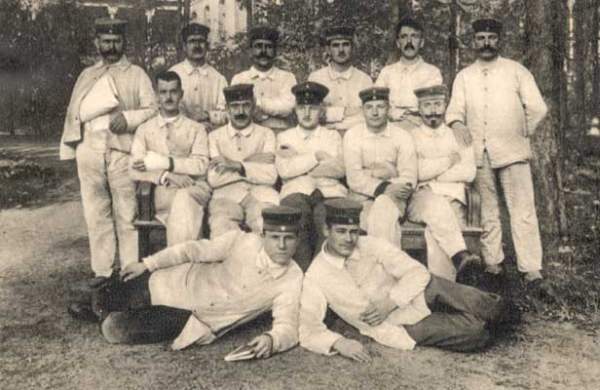
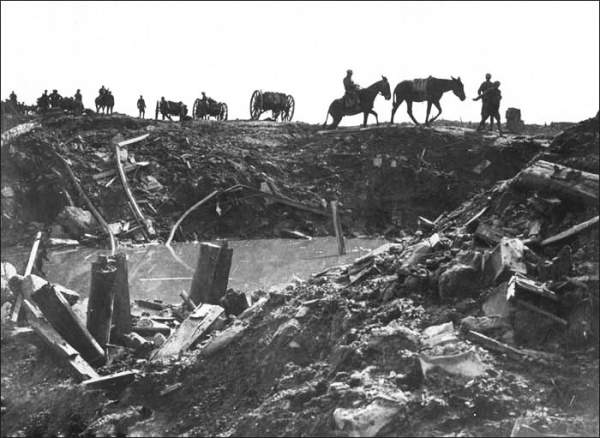
List Regiment
: (November 3, 1917-March 25 1918) Gefreiter Adolf Hitler endures trench warfare north of Ailette with 3 Company, 16 Bavarian Reserve Infantry Regiment. [For further details, Click here.]1917: World War I: Georges Clemenceau named French prime minister:
On November 15, 1917, with his country embroiled in a bitter international conflict that would eventually take the lives of over 1 million of its young men, 76-year-old Georges Clemenceau is named prime minister of France for the second time. [For further details, Click here.]
1919 The US Senate invokes its first closure to end a filibuster over the Versailles Treaty:
In 1841, when the Democratic minority hoped to block a bank bill promoted by Kentucky Senator Henry Clay, he threatened to change Senate rules to allow the majority to close debate. Missouri Senator Thomas Hart Benton rebuked Clay for trying to stifle the Senate's right to unlimited debate.
Three quarters of a century later, in 1917, senators adopted a rule (Rule 22), at the urging President Woodrow Wilson, that allowed the Senate to end a debate with a two-thirds majority vote, a device known as "cloture." The new Senate rule was first put to the test in 1919, when the Senate invoked cloture to end a filibuster against the Treaty of Versailles. Even with the new cloture rule, filibusters remained an effective means to block legislation, since a two-thirds vote is difficult to obtain. [For further details, Click here.]
1920 League of Nations: The Free City of Danzig is established under the League of Nations protection as the very first session opens in Geneva. 41 nations are represented, and more than 20 nations will later join, though there will be numerous withdrawals and rejoinings over the years. One well known withdrawal will be inextricably linked with this day's first major action.
In the 1919 Treaty of Versailles, the victorious powers of World War I (the United States, Great Britain, France, and other allied states) imposed punitive territorial, military, and economic treaty terms on defeated Germany. One provision required Germany to cede West Prussia to the newly reconstructed state of Poland. Danzig, largely an ethnically German city, became a "free city" under the protection of the League of Nations (the worldwide organization of states established by the treaty), but with special administrative ties to Poland.
1923 Rampant inflation in Germany reaches a peak when the Mark rises to 4,200,000,000 to the dollar:
From Mid-1922 to November 1923 hyperinflation raged...Seemingly Reichsbank officials believed that the basic trouble was the depreciation of the mark in terms of foreign currencies. In late 1922 they tried to support the mark by purchasing it in the foreign exchange markets. However, since they continued printing new currency at a feverish rate, the attempt failed. They merely succeeded in buying worthless marks in return for valuable gold and foreign exchange. All hope of checking the collapse of the mark vanished in January 1923 when the French--alleging treaty violations--occupied Germany's key industrial district, the Ruhr. Germany subsidized the occupied companies and financed an expensive program of "passive resistance." New billions of marks were printing to finance these heavy new costs. By late 1923, 300 paper mills were working top speed and 150 printing companies had 2000 presses going day and night turning out currency. [For further details, Click here.]
1934 Church and Reich: Cardinal Faulhaber writes a letter to the World Jewish Congress protesting "the use of his name by a conference demanding the commercial boycott of Germany, that is, economic war." (THP)
We bishops are being asked why the Catholic Church, as often in its history, does not intervene on behalf of the Jews. This is not possible at this time because the struggle against the Jews would then, at the same time, become a struggle against the Catholics, and because the Jews can help themselves. [For further details, Click here.]
1935 Holocaust: Germany publishes regulations to execute the Nuremberg Laws:
The first law, The Law for the Protection of German Blood and German Honor, prohibited marriages and extra-marital intercourse between "Jews " (the name was now officially used in place of "non-Aryans ") and "Germans " and also the employment of "German " females under forty-five in Jewish households. The second law, The Reich Citizenship Law, stripped Jews of their German citizenship and introduced a new distinction between "Reich citizens " and "nationals." The Nuremberg Laws by their general nature formalized the unofficial and particular measures taken against Jews. [For further details, Click here.]
1938 Holocaust: All Jewish children are excluded from the German school system.
1940 Various:
USA:
Holocaust: The Warsaw Ghetto officially comes into existence:
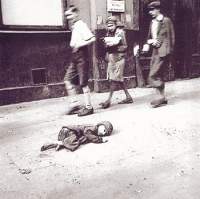
Plans for a Jewish ghetto had in fact existed since the beginning of the Nazi occupation of Warsaw, but in October 1940 they finally began to take form. A small district South West of the Old Town, in the centre of the city, was chosen and 113,000 Poles were evacuated to make way for Warsaw's 400,000 Jews. Thirty percent of the city's population were now living in an area that constituted less than three square miles, or 2.4 % of the capital. In November that area was closed off by a formidable wall, topped with barbed wire. [For further details, Click here.]
1941 World War II: Various: German forces under von Bock begin the second phase of the battle for Moscow:
The city was a primary target for the large and well-equipped Army Group Center. The forces committed to Operation Typhoon included three armies (the 2nd, 4th and 9th) supported by three Panzer Groups (the 2nd, 3rd and 4th) and by the Luftwaffe's Second Air Fleet. Overall, more than one million men were committed to the operation, along with 1,700 tanks, 14,000 guns, and 950 planes. The attack relied on standard blitzkrieg tactics, using Panzer groups rushing deep into Soviet formations and executing double-pincer movements, pocketing Red Army divisions and destroying them. [For further details, Click here.]
Countdown to Infamy: Tokyo (Togo) to Washington (Riyoji): "As relations between Japan and the United States are most critical, make your "ships in harbor report" irregular, but at a rate of twice a week. Although you already are no doubt aware, please take extra care to maintain secrecy." [For further details, Click here.]
Holocaust: Himmler and Rosenberg hold a four-hour meeting to discuss Jewish policy and several other areas of their disagreement. (THP)
1943 World War II: Various: Russian Front:
Holocaust: Nov 15-6 Some 2,000 Jews arrive at Auschwitz from Holland. Gassed at Auschwitz this day also are 164 Poles including 12 female members of a resistance group. (THP)
Himmler orders Gypsies to concentration camps:
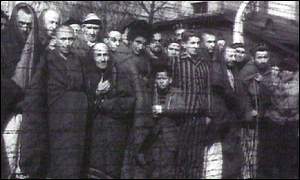
On this day in 1943, Heinrich Himmler makes public an order that Gypsies and those of mixed Gypsy blood are to be put on "the same level as Jews and placed in concentration camps."
Himmler was determined to prosecute Nazism racial policies, which dictated the elimination from Germany and German-controlled territories all races deemed "inferior," as well as "asocial" types, such as hardcore criminals. Gypsies fell into both categories according to the thinking of Nazi ideologues and had been executed in droves both in Poland and the Soviet Union. The order of November 15 was merely a more comprehensive program, as it included the deportation to Auschwitz of Gypsies already in labor camps.
That Himmler would promulgate such a program should come as no surprise to anyone familiar with his resume. As head of the Waffen-Schutzstaffel ("Armed Black Shirts"), the SS, the military arm of the Nazi Party, and assistant chief of the Gestapo (the secret police), Himmler was able over time to consolidate control over all police forces of the Reich. This power grab would prove highly effective in carrying out the Fuhrer's Final Solution. It was Himmler who organized the creation of death camps throughout Eastern Europe and the creation of a pool of slave laborers. (History.com)
1944 World War II Churchill to FDR:

Thank you for your kind wishes about the Paris - de Gaulle trip. I certainly had a wonderful reception from about half a million French in the Champs Elysees, and also from the partly Opposition Centre at the Hotel de Ville. I re-established friendly private relations with de Gaulle . . . .
You may be sure that our discussions about important things took place only on an ad referendum basis to the three great powers, and of course especially to you, who have by far the largest forces in France . . . .
He is of course anxious to obtain full modern equipment for eight more divisions, which can only be supplied by you. S.H.E.A.F. reasonably contends that these will not be ready for the defeat of Germany in the field and that shipping must be devoted to the upkeep of the actual forces that will win the battles of the winter and spring. I reinforced this argument. At the same time I sympathize with the French wish to take over more of the line, to have the best share they can in the fighting or what is left of it—and there may be plenty—and not to have to go into Germany as a so-called conqueror who has not fought. I remarked that this is a sentimental point which ought nevertheless to receive consideration.
The important thing for France was to have an Army prepared for the task which it would actually have to discharge, namely, their obligation first to maintain a peaceful and orderly country behind the front of our armies, and secondly to assist in holding down parts of Germany later on. On the second point the French pressed very strongly to have a share in the occupation of Germany, not merely as sub-participation under British or American command, but as a French command. I expressed my sympathy with this, knowing well that there will be a time not many years distant when the American armies will go home and when the British will have great difficulty in maintaining large forces overseas, so contrary to our mode of life and disproportionate to our resources, and I urged them to study the type of army fitted for that purpose, which is totally different from the organization by divisions required to break the resistance of a modern war-hardened enemy army. They were impressed by this argument, but nevertheless pressed their view . . . .
It is evident however that there are a number of questions which press for decision at a higher level than that of the High Commands, without which decisions no clear guidance can be given. Here is another reason why we should have triple meeting if U.J. will not come, or a quadruple meeting if he will. In the latter case the French would be in on some subjects and out on others. One must realize that before five years are out a French army must be made to take on the main task of holding down Germany.
1957 Cold War: Nikita Khrushchev challenges United States to a missile "shooting match":
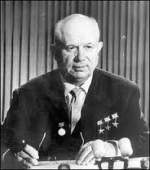
In a long and rambling interview with an American reporter, Soviet leader Nikita Khrushchev claims that the Soviet Union has missile superiority over the United States and challenges America to a missile "shooting match" to prove his assertion. The interview further fueled fears in the United States that the nation was falling perilously behind the Soviets in the arms race. [For further information, click here]
1969 Vietnam War: A quarter of a million protesters stage a peaceful demonstration in Washington DC against the war.
1977 President Carter hosts Shah of Iran:

President Jimmy Carter welcomes Mohammad Reza Pahlavi, the shah of Iran, and his wife, Empress (or "Shahbanou") Farrah, to Washington. Over the next two days, Carter and Pahlavi discussed improving relations between the two countries. Two years later, the two leaders' political fates would be further entwined when Islamic fundamentalists overthrew the shah and took Americans hostage in Tehran. [For further information, click here]
1988 Middle East: PLO leader Yasser Arafat proclaims the creation of the State of Palestine as "the state of Palestinians wherever they may be". [For further information, click here.]
Edited by Levi Bookin (Copy editor) Click to join 3rdReichStudies Disclaimer: This site includes diverse and controversial materials--such as excerpts from the writings of racists and anti-Semites--so that its readers can learn the nature and extent of hate and anti-Semitic discourse. It is our sincere belief that only the informed citizen can prevail over the ignorance of Racialist "thought." Far from approving these writings, this site condemns racism in all of its forms and manifestations.
levi.bookin@gmail.com










Fair Use Notice: This site may contain copyrighted material the use of which has not always been specifically authorized by the copyright owner. We are making such material available in our efforts to advance understanding of historical, political, human rights, economic, democracy, scientific, environmental, and social justice issues, etc. We believe this constitutes a "fair use" of any such copyrighted material as provided for in section 107 of the US Copyright Law. In accordance with Title 17 U.S.C. Section 107, the material on this site is distributed without profit to those who have expressed a prior interest in receiving the included information for research and educational purposes. If you wish to use copyrighted material from this site for purposes of your own that go beyond 'fair use', you must obtain permission from the copyright owner.
Please Note: The list-owner and the moderator of 3rdReichStudies are not responsible for, and do not necessarily approve of, the random ads placed on our pages by our web server. They are the unfortunate price one pays for a 'free' website.



